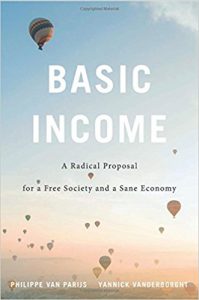 Basic Income: A Radical Proposal for a Free Society and a Sane Economy
Basic Income: A Radical Proposal for a Free Society and a Sane Economy
By Philippe Van Parijs and Yannick Vanderborght (Harvard University Press, 400 pp., $29.95)
I was asked to write a review of a book on the basic income – the idea that everyone in society gets a significant free, no-strings-attached income from the government every year – for City Journal. The basic income, or universal basic income, is getting huge mindshare in places like Silicon Valley as they try to think about what to do after they put everybody else out of a job.
The only problem is that by the criteria of the huge boosters the basic income who wrote this book, it’s a non-starter in America. And it has huge practical and moral questions.
This review has already provoked significant, extreme, and highly polarized reactions. That’s something I attribute to their views of the basic income generally.
Here’s an excerpt:
The overarching goal of the basic-income proposal is to ease economic distress stemming from the structural disappearance of work and declining real incomes for lower-skilled workers. Technology has eliminated countless jobs, and there’s no reason to believe that this process won’t continue. Researchers from MIT and Oxford have estimated that technology already in development, such as driverless cars, could eliminate nearly half of all current jobs in the United States. One does not have to accept this particular analysis to recognize the anxieties that exist—one reason why Silicon Valley supports the idea.
…
Some humility from the authors would have been welcome about the risks of the radical restructuring that basic income would entail; Van Parijs and Vanderborght see only upside. To illustrate the downside potential, consider the poor results from annual per-capita payments of casino revenues to American Indian tribes (not discussed in the book). Some tribes enjoy a very high “basic income”—sometimes as high as $100,000 per year— in the form of these payments. But as the Economist reports, “as payment grows more Native Americans have stopped working and fallen into a drug and alcohol abuse lifestyle that has carried them back into poverty.” The magazine contrasts this fate with that of more successful tribes like Washington State’s Jamestown S’Klallam, which eliminated poverty by investing in tribal-owned small businesses instead of handing out cash grants.
Click through to read the whole thing.
from Aaron M. Renn
http://www.urbanophile.com/2017/08/14/why-the-basic-income-wont-work/
No comments:
Post a Comment